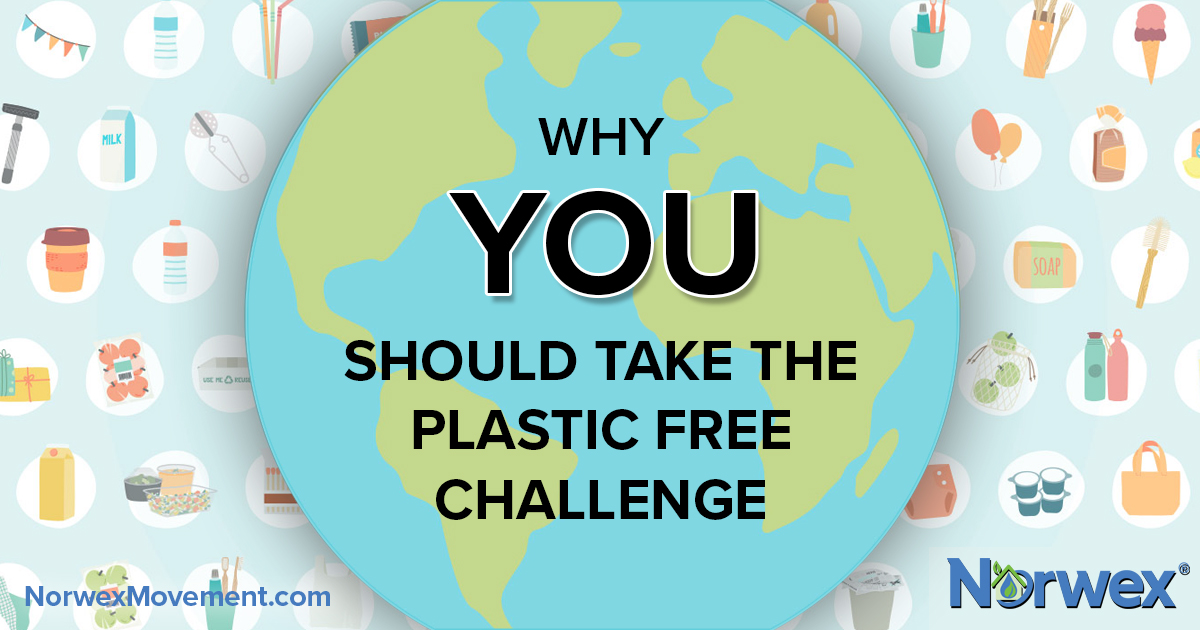

I know many of us have been concerned about the problem of plastic for a while now. We hate how it’s choking our planet and the creatures that live here, especially in our oceans.
UN.org reports plastic pollution has a tremendously harmful impact on marine resources:
And the sad truth is, even if we’re faithful to always recycle plastic, unfortunately recycling isn’t really solving the problem. The best way to reduce the harm of plastic is to not use it all.
That’s why I was thrilled to learn about the Australia-based Plastic Free Foundation and the work they’re doing worldwide to bring awareness and education about the problem of plastic in our environment. The Plastic Free Foundation engages millions of people in more than 170 countries and provides tools and resources to help us all reduce the use of plastic.
One of the foundation’s key initiatives is called Plastic Free in July—an idea I’m excited about! I’m going to give it a go, and I invite you to join me. It’s easy to get started, and you can commit just for a while, the whole month or however long and at whatever level you and your family are comfortable.
The first step is to take the Plastic Free Challenge where you’ll also sign up to receive emails and tips for reducing plastic.
In the next few weeks, I commit to:
As someone who already tries to cut down on the plastic I use, this seems relatively simple, but I’m interested to see what it may reveal about my habits and where I may be falling short. I’m sure I’ll encounter some unexpected challenges along the way, but I’m excited to learn how I can improve. I will also share this with my kids and ask them to help hold me accountable. (And I trust the Norwex Home Office team will help keep me honest, too!)
 So what do you think? Want to join me in going Plastic Free? I’d love to hear your thoughts about what you’re doing already and how you plan to reduce your use of plastic even further. Remember, by joining forces we can make a big difference for our world!
So what do you think? Want to join me in going Plastic Free? I’d love to hear your thoughts about what you’re doing already and how you plan to reduce your use of plastic even further. Remember, by joining forces we can make a big difference for our world! Taking the Plastic Free Foundation’s Pesky Plastics Quiz helps us know where we are now, so we can measure our success at the end of July.
Taking the Plastic Free Foundation’s Pesky Plastics Quiz helps us know where we are now, so we can measure our success at the end of July.
Resources:
I’m not sure how to elliminate the plastic containers I have to use for my boiled water. I’m in the boonies. Any suggestions?
But you use them over & over correct?
Yes I do use them over and over but I won’t be buying inexpensive plastics anymore.
I have been trying to cut way down on plastic and paper. Just one example: I used to buy the big bins of spinach. When I realized that those bins probably won’t be recycled, I buy them in bags. I’m almost 63. When I was a kid, there was no way to get pre-washed veggies and fruit. The produce section was much more eco-friendly. My mom would buy veggies to feed 10 kids, and never was there a plastic container. One exeption was strawberries and blueberries which came in a plastic little basket, but no plastic top. Milk was in glass that was recycled at the store. Soft drinks also were glass and always recycled! You could save bacon fat and sell it back to the store! Mom would buy a gallon of honey in a tin can, then use the can to save bacon fat. Then she’d return it to the grocery store for cash. Then the plastics lobby started a big campaign to make us think plastic was great They knew that silly recycle sign would fool us,… Read more »
I miss those little green berry baskets! My mom always kept them for storing stuff & for art supplies, so they got used multiple times.
Anne, thank you so much for your comment. Several of us also remember the little baskets of berries you refer to. Times were much simpler then and with a lot less plastic! Thanks for doing everything you can to reduce the use of plastic in your home; we applaud you! And yes, our microfiber is manufactured in China, as you noticed. Actually, that is the best place for us to create our extraordinary microfiber, as China is a world leader in the textile industry. We own our microfiber manufacturing facility there, which allows us to oversee production and to ensure the highest quality microfiber available anywhere. Norwex is also a member of the United Nations Global Compact, whose members commit to aligning business strategies and operations with Ten Principles on human rights, labor, the environment and anti-corruption (https://www.unglobalcompact.org/) . Regarding the oversized package your products arrived in, please know that we appreciate your feedback and are continually researching ways to be more planet-friendly. We will pass this information along to our distribution team.
Thank you for that info. Very interesting.
You are so right on many things. I know we need trade but why cant we make the microfiber in each country selling the products?
Thank you for sharing this.
I love this idea! I’m not sure how to avoid some types of plastic (like on blocks of cheese, deli meats, etc.), but I’m going to do my best!
A lot of retailers in my area are not allowing use of reusable grocery bags siting COVID. I also can’t use my own cup. Single use styrofoam is all that is being allowed. Since all the water fountains are turned off there is less need for my own cup even if I could use it. Once these restrictions are lifted, then I’ll try a month free of plastic.
Kim, you bring up a very good point. We’re all facing more challenges than ever these days, including some restrictions by retailers on reusable bags and cups, as you mention. As the Plastic Free Foundation stated, “We know that Covid-19 is making things trickier than it might have been in previous years. So this is a gentle reminder not to let the things you can’t do get you down. There are plenty of swaps that you can try inside the home, even if it’s harder when you’re out and about. We are not expecting you to be perfect. The trying is the important bit! And it goes without saying, please don’t risk your health.”
That said, if you think of a good way to reuse the plastic and/or Styrofoam that we all might inadvertently receive, please share. We welcome readers’ suggestions.
If self checkout is available you can use your own bags.
There are so many ways plastics are in our everyday life that I haven’t thought about….like packaging on cheese. Never thought about that being a one time use pkg. !
Every piece of plastic we don’t take home is a “WIN”!!
Paula, we couldn’t agree more. While we can’t completely get rid of plastic in our lives all at once, we can take steps. And each step is most definitely a “WIN”. Thanks for being a part of the solution!
I don’t use straws, unless I am out at a fast food place. I am going to get the Norwex stainless steel straws to and put one in my purse to use when I am out. I just don’t know how to separate my meat for the freezer without using ziplock bags.
Have you tried freezer paper with a wax coating?
I just bought Ice cream and it came in a plastic container!
I have been trying to be plastic free for about a year.
I use a steel straw, avoid plastic bottles, using my insulated cup instead for beverages, and don’t use plastic coffee cups. The main plastic trash I have is what food is packaged in at the grocery store, such as lunch meats and cheeses.
i tried the challenge a couple of years ago and it really opened my eyes as to my usage, i have made a lot of improvements since then and even bring my own collapsable container when i am able to go out for any leftovers i may be able to bring home. Any change to the better is good!!
Can you tell me about the plastic bags included with party orders? Are they made from recyclables? What’s the best way to dispose of them? “Can they be washed and reused” a customer asks. If we use these bags we aren’t really going plastic free are we?
Katherine, thanks for your great question. The bags currently included with Norwex Party orders are biodegradable as well as compostable. They can be used more than once and then disposed of or composted. See our blog from several years ago to learn more. https://www.norwexmovement.com/recycled-vs-biodegradable-vs-compostable/.
Love this movement!
It’s a great idea!
should do this every month.
How can Norwex avoid using plastic for their cleaning products/ laundry detergents? I have a client that wants to avoid plastic but I’m having a hard time offering her cleaning products because they are all in plastic bottles of containers? Any help would be great in how to sell this.
McKenzie, thank you for your inquiry about Norwex product packaging. You may want to share with your client the fact that many of our household cleaning products, including our Stain Remover, are now packaged in 25% OceanBound plastic, which is plastic waste that, for whatever reason, had fallen outside normal collection processes and was at risk of entering the world’s oceans. For more info, see this blog: https://www.norwexmovement.com/cleaning-up-our-oceans-one-plastic-bottle-at-a-time/. In addition, Norwex laundry products like our Ultra Power Plus™ Laundry Detergent and our Liquid Laundry Detergent are super-concentrated, which helps reduce the amount of packaging required for them. For example a 2.2 pound bag of Ultra Power Plus cleans up to 100 loads of laundry in a high-efficiency machine and 66 in a conventional machine. Similarly, our 17-ounce bottle of Liquid Laundry Detergent handles up to 215 HE loads and 107 conventional loads. Less plastic packaging for the same volume of clean clothes—and with no harmful chemicals coating them! If you have further product-related questions, in the U.S., please contact our Consultant Care Center at 1-866-450-7499. In Canada, please contact 1-877-766-7939.… Read more »